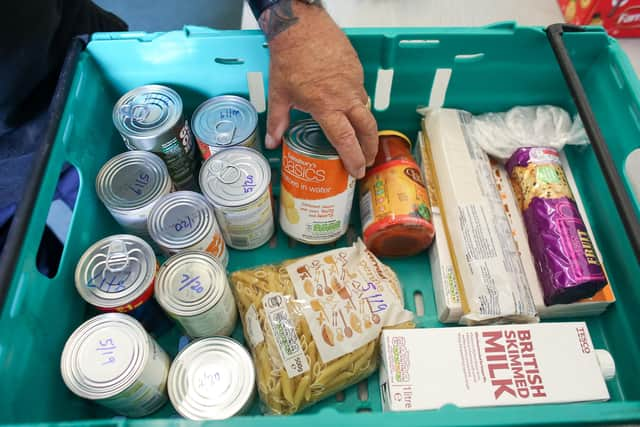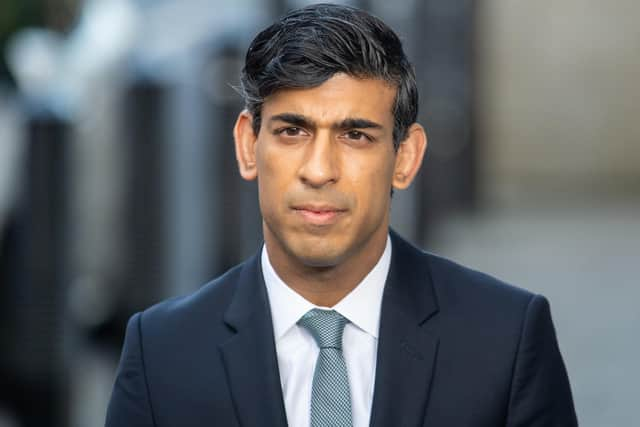Why families should have virus debts paid off – Niall Cooper


And yet, at the same time, Covid has exposed and intensified our society’s great inequalities. I saw further galling evidence of that last week when a colleague spoke at length with a member of one of the growing number of local pantries run by churches and other community partners.
She didn’t want us to use her real name, such is the enduring, regrettable stigma around poverty, so we are using a pseudonym: Maria. She did, however, want to share her story, to raise awareness of the difficulties facing families like hers.
Advertisement
Hide AdAdvertisement
Hide AdMaria lives with her husband and their two young children. They had struggled to find secure work a few years ago and had built up debts of £7,000 as a result. By the start of 2020 things were looking up. Maria’s husband was settled in a good job, they owned their own house and were paying back their debts. Then Covid hit.


Maria’s husband had been doing really well at work and had been there nearly two years, but his employer made him and several colleagues redundant when the scale of the pandemic began to emerge. Not furloughed, simply made redundant.
Their lives, like millions of others, were thrown into turmoil. But whereas many have been kept afloat by Government interventions, Maria’s family was left adrift in the storm. They applied for Universal Credit, but did not receive a penny for two months. They were permitted a three-month mortgage pause, but no more than that.
Inevitably, as essential costs continued and income fell, their debts increased. Maria’s one stroke of luck is having friends who were able to lend them money, but her family’s debt is now around £15,000 – more than twice what it was before March. Naturally, Maria and her husband’s mental health has suffered.
Advertisement
Hide AdAdvertisement
Hide AdHer husband does now have a new job, but the debts accrued by Maria’s family and millions of others will take years to clear unless something changes.


That’s why we launched the Reset The Debt campaign, which is calling for urgent Government action to lift the additional burden that Covid-related debts are placing on households, before families are overwhelmed.
Thankfully Maria’s children are too young to realise that the few Christmas and birthday gifts will be second-hand toys, rather than new ones. “The house needs some repairs but we can’t afford to repair anything,” Maria told us.
“It’s very difficult; there are everyday comforts we can’t afford. The sink has a big crack in it but we can’t afford to replace it.”
Advertisement
Hide AdAdvertisement
Hide AdThere is very little Maria’s family could have done differently. They have cut their outgoings and followed all the rules, but instead of being kept afloat, they have become weighed down by unpayable debt.
Millions of people are in a similar position. More than a third of families with children lost income as a result of lockdown. People already on the lowest incomes have frequently been hit hardest – 54 per cent of the lowest-income families have had to borrow to pay for necessities during the pandemic; four in 10 families with children have struggled to pay their rent; and more than 350,000 households have been threatened with eviction.
It is not right that those with the least should bear the heaviest Covid burden. Fortunately, there is a solution.
The Reset The Debt campaign was launched by the Baptist Union, the Church of Scotland, Church Action on Poverty, the Methodist Church and the United Reform Church, and has since been supported by other charities and 500 church leaders.
Advertisement
Hide AdAdvertisement
Hide AdThe Chancellor has come up with many ambitious lifelines to protect sectors of the economy, millions of workers, and many others in vulnerable situations. But others reaching for lifelines are finding nothing. More must be done. Without action, almost three million people are at high risk of long-term debt because of the pandemic.
Reset the Debt is calling on the Chancellor to create a Jubilee Fund to pay off or cancel unavoidable debt accrued by households since the start of the Covid crisis. Maria, and families like hers would be freed from the millstone of debilitating debt. Communities have come together in 2020, showing compassion in abundance. We now need the Government to extend this compassion to people like Maria, and ensure a just post-Covid future for all.
Niall Cooper is director of Church Action on Poverty.
Support The Yorkshire Post and become a subscriber today. Your subscription will help us to continue to bring quality news to the people of Yorkshire. In return, you’ll see fewer ads on site, get free access to our app and receive exclusive members-only offers. Click here to subscribe.
Comment Guidelines
National World encourages reader discussion on our stories. User feedback, insights and back-and-forth exchanges add a rich layer of context to reporting. Please review our Community Guidelines before commenting.